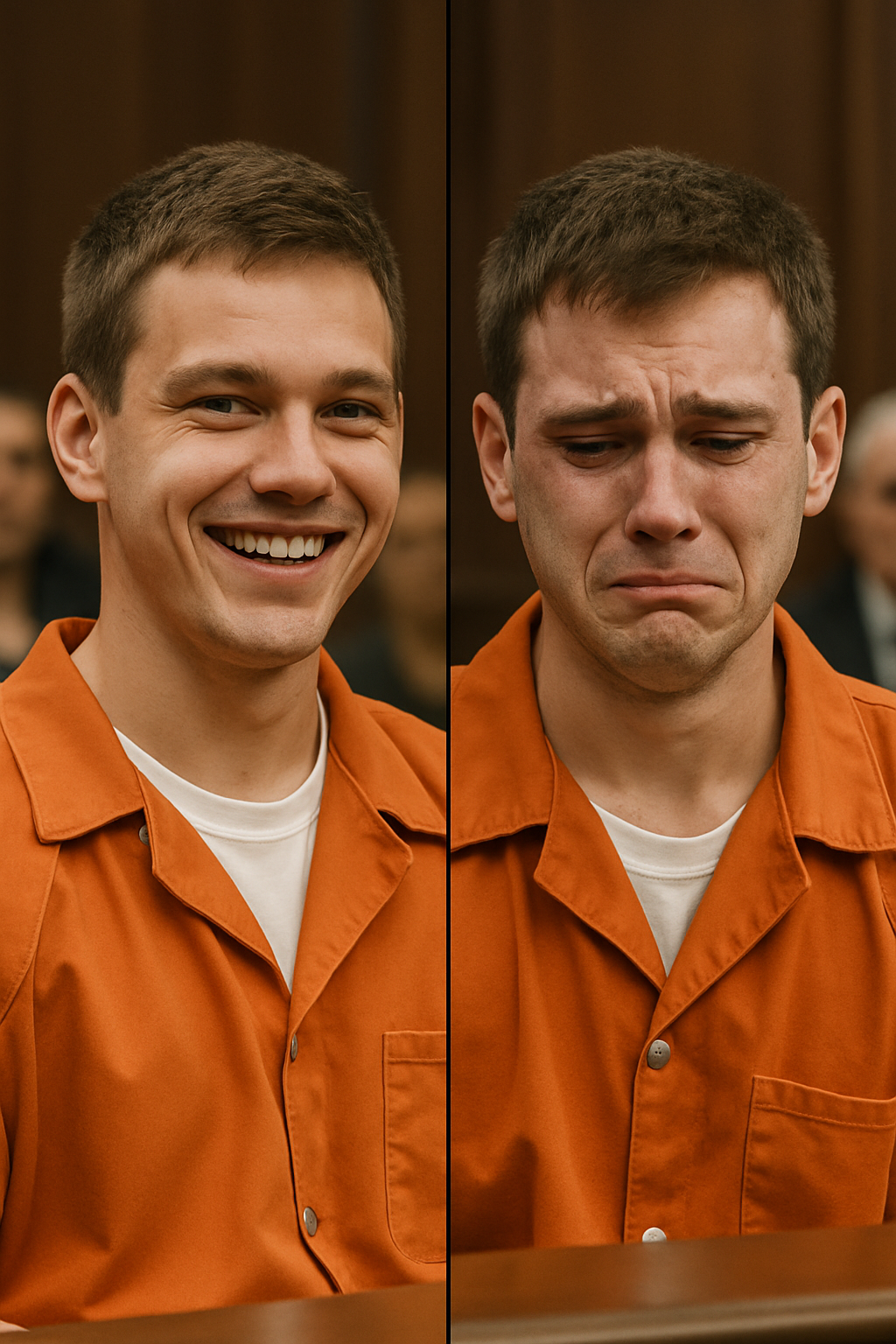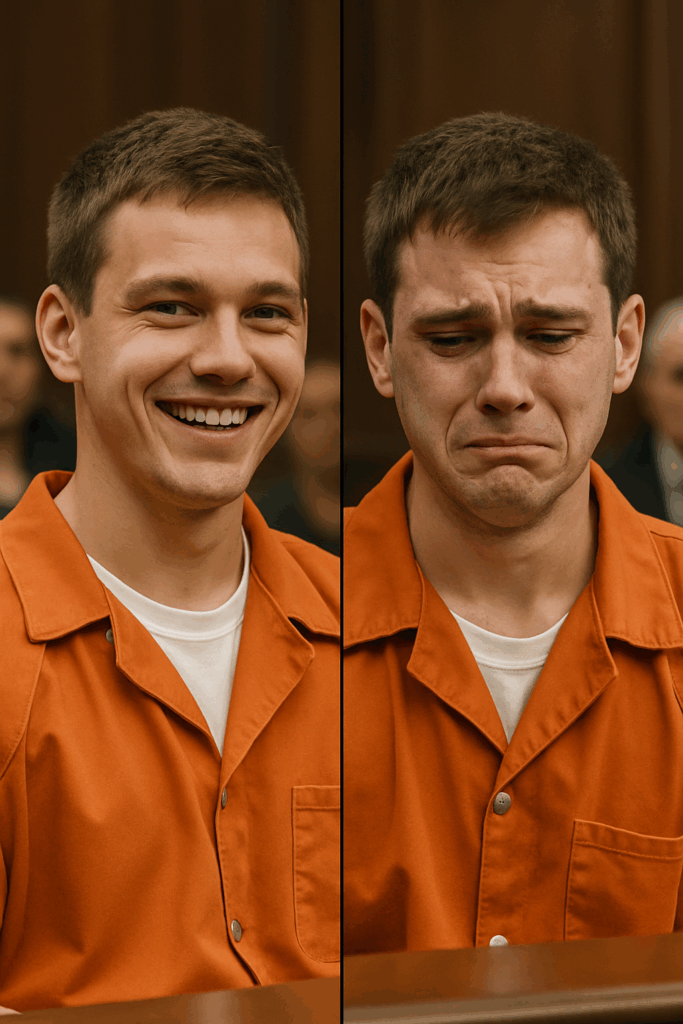Teen Criminal Laughs at the Judge – But When His Mother Speaks Up, the Courtroom Falls Silent…
The first time I ever laid eyes on Ryan Cooper, I didn’t see a hardened criminal. I saw a teenager—skinny, pale, with acne dotting his cheeks and defiance burning in his eyes. But as the bailiff led him into the courtroom that day, the atmosphere shifted.
Ryan didn’t walk like a boy in trouble. He walked like a king without a crown, shoulders squared, sneakers squeaking against polished tile, lips curled into an arrogant grin. The whispers in the room were deafening. Some shook their heads in pity. Others muttered curses under their breath.
And then Ryan smirked.
That smirk—careless, cocky, utterly fearless—cut through the room like a blade.
Judge Alan Whitmore had been on the bench for over thirty years. He’d presided over trials of embezzlers, addicts, violent offenders, and tearful teenagers who stumbled down the wrong path. He’d seen remorse, rage, fear, and regret.
But never this.
Never a seventeen-year-old who looked proud to be standing trial.
The file on Ryan was thick:
Two shoplifting arrests at the local mall.
A car break-in spree, caught on neighborhood security cameras.
And finally—the worst—breaking into a family’s home while they were on vacation. He stole jewelry, electronics, and cash, leaving the house ransacked.
The evidence was undeniable. The boy’s fingerprints were everywhere.
And yet Ryan slouched in his chair as though the outcome didn’t matter.
When the formalities were done, Judge Whitmore peered down over his glasses.
“Mr. Cooper,” he said firmly. “Before I pass sentence, do you have anything to say for yourself?”
Ryan grinned. “Yeah, Your Honor. I guess I’ll just be back here next month anyway. You guys can’t do anything to me. Juvenile detention? Please. It’s like summer camp with locks.”
A ripple of gasps filled the courtroom. The prosecutor shook her head. Even Ryan’s public defender shifted uncomfortably in his seat.

The judge’s jaw tightened. His voice dropped, low and dangerous.
“Mr. Cooper, you think the law is a game. You think your age shields you from consequences. But I assure you—” he paused, leaning forward, “—you are standing on the edge of a cliff.”
Ryan shrugged. “Cliffs don’t scare me.”
And then it happened.
A voice, trembling but clear, cut through the silence.
“Enough, Ryan!”
All eyes turned.
In the back row stood Karen Cooper, Ryan’s mother. Early forties, hair pulled back into a tight bun, dark circles under her eyes that spoke of sleepless nights. She had sat silently through every hearing, clinging to hope that her son would show regret. But this—watching him laugh in the face of justice—was too much.
“You don’t get to stand there and act like this is some kind of joke,” she said, her voice cracking. “Not anymore.”
Ryan’s smirk faltered. “Mom, sit down—”
“No!” she cried, her hands trembling. “I raised you better than this. I worked two jobs to keep food on the table. I gave up everything so you could have a chance. And this is how you repay me? By breaking into homes, stealing from families, and laughing in a judge’s face?”
The courtroom was frozen, hanging on every word.
“I’m done covering for you,” Karen continued, tears streaking her cheeks. “If you think you’re untouchable, then hear me now—you’re not. Not with the law. Not with me.”
For the first time, Ryan’s bravado cracked. His face drained of color.
Because Karen wasn’t finished.
She turned to Judge Whitmore. “Your Honor, my son thinks he’s immune to consequences because I’ve bailed him out every time. Paid the fines. Smoothed things over. Told the neighbors he was just a ‘troubled teen.’” She shook her head. “But I won’t do it anymore. Whatever sentence you give him—I support it.”
The room erupted in murmurs. Ryan’s jaw dropped. “Mom! You can’t—”
“I can,” she said, voice steady now. “And I will. Because if you don’t learn now, you’ll destroy yourself—and you’ll destroy me with you.”
Judge Whitmore leaned back, studying the boy who suddenly looked less like a king and more like a child caught in the act.
“Mr. Cooper,” he said finally, “your mother’s courage today may be the only reason you have a future at all.”
Then came the sentence. Not just juvenile detention, but a rehabilitation program: mandatory counseling, community service, restitution to his victims, and six months in a secure youth facility.
Ryan’s mouth opened in protest, but the judge raised a hand.
“Cliffs may not scare you,” Judge Whitmore said coldly, “but falling will.”
As the gavel struck, Karen wept quietly into her hands. For her, it wasn’t victory. It was heartbreak.
Ryan was led away, his swagger gone, his sneakers scuffing the floor instead of squeaking.
The courtroom emptied slowly, people whispering about the mother who’d turned against her own son. Some called her brave. Others whispered she was cruel.
But I saw it differently.
Karen hadn’t betrayed her son. She had saved him.
Sometimes the hardest act of love isn’t protecting your child from consequences—it’s forcing them to face them.
And as I left that day, one question lingered in my mind:
How many parents enable their children’s downfall—out of love, out of fear, out of desperation—without realizing that letting go might be the only way to save them?


